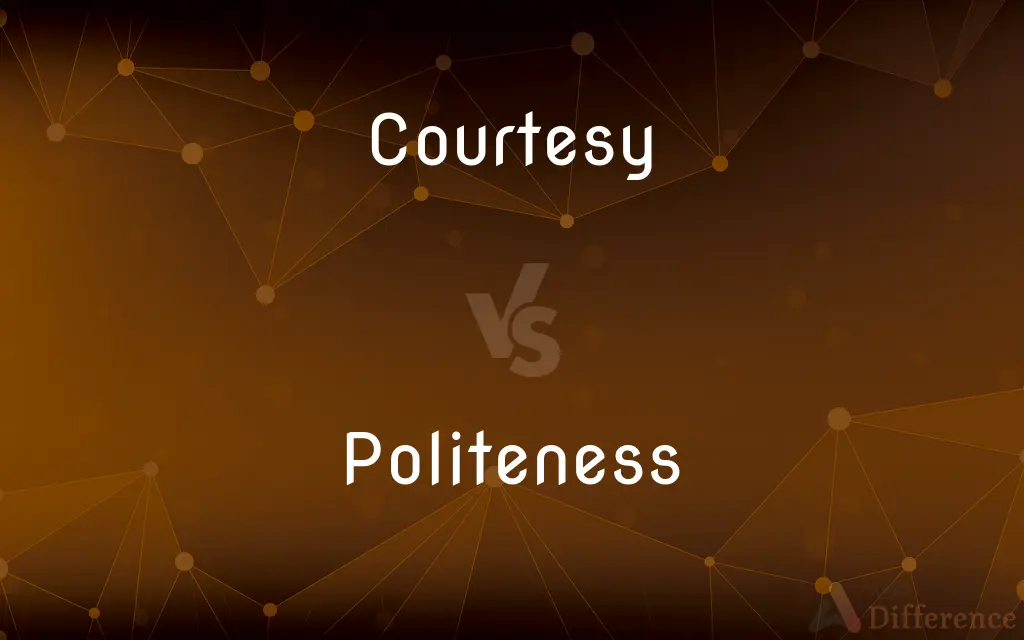Courtesy vs. Politeness — What's the Difference?
By Tayyaba Rehman & Fiza Rafique — Published on October 8, 2023
Courtesy is a considerate behavior towards others, while politeness is showing good manners and respect.

Difference Between Courtesy and Politeness
Table of Contents
ADVERTISEMENT
Key Differences
Courtesy often stems from a sense of kindness or a desire to make others feel comfortable and respected. It's an act or gesture, sometimes even going beyond what's expected, to show consideration or to offer help. Politeness, on the other hand, revolves around adhering to social conventions and showing good manners. It is often expected and is considered a basic social etiquette.
While both courtesy and politeness relate to treating others well, courtesy often encompasses a broader range of behaviors, including those acts which are not strictly necessary but are done out of kindness. For instance, holding the door for someone carrying heavy items is a courtesy. Politeness, conversely, is more about conforming to accepted behaviors to avoid causing offense, such as saying "please" and "thank you."
Courtesy can sometimes be situational, based on specific circumstances where one feels the need to be especially considerate. For instance, giving up one's seat for an elderly person on a bus is a gesture of courtesy. Politeness is more constant and is generally expected in most interactions, like addressing someone properly.
In essence, while there's an overlap between courtesy and politeness, the key difference lies in their scope and intention. Courtesy often goes above and beyond the call of duty, while politeness is more about adhering to societal norms and expectations in everyday interactions.
Comparison Chart
Nature
Considerate behavior towards others.
Showing good manners and respect.
ADVERTISEMENT
Scope
Can go beyond what's expected.
Adheres to social conventions.
Consistency
Situational, based on circumstances.
Generally constant in interactions.
Intention
Making others feel comfortable or helped.
Avoiding causing offense.
Relationship to Norms
Might not always be expected.
Generally expected in societal norms.
Compare with Definitions
Courtesy
Considerate behavior towards others.
He showed great courtesy by helping her with her luggage.
Politeness
A mannerly way of acting or speaking.
He declined the offer with politeness and grace.
Courtesy
A gesture of goodwill or respect.
They sent a gift as a courtesy after the event.
Politeness
The quality of being respectful and considerate.
His politeness was evident in every conversation.
Courtesy
Polite behavior.
Politeness
Behavior that avoids offending others.
She showed politeness by not commenting on the mistake.
Courtesy
A polite gesture or remark.
Politeness
Observance of societal etiquette.
In some cultures, direct eye contact is not seen as politeness.
Courtesy
Consent or agreement in spite of fact; indulgence
They call this pond a lake by courtesy only.
Politeness
Marked by or showing consideration for others and observance of accepted social usage.
Courtesy
Willingness or generosity in providing something needed
Free advertising through the courtesy of the local newspaper.
Politeness
Refined; elegant
Polite society.
Courtesy
Given or done as a polite gesture
Paid a courtesy visit to the new neighbors.
Politeness
The quality of being polite.
Courtesy
Free of charge
Courtesy tickets for the reporters.
Politeness
An act of politeness.
Courtesy
(uncountable) Polite behavior.
Please extend them the courtesy of your presence.
He was always known for his grace, kindness, and courtesy to people of every rank.
Politeness
High finish; smoothness; burnished elegance.
Courtesy
(countable) A polite gesture or remark, especially as opposed to an obligation or standard practice.
I offered them a ride simply as a courtesy.
Politeness
The quality or state of being polite; refinement of manners; urbanity; courteous behavior; complaisance; obliging attentions.
Courtesy
(uncountable) Consent or agreement in spite of fact; indulgence.
They call this pond a lake by courtesy only.
Politeness
A courteous manner that respects accepted social usage
Courtesy
(uncountable) Willingness or generosity in providing something needed.
They received free advertising through the courtesy of the local newspaper.
[on a label, caption, etc.] Courtesy the Smith Foundation: [e.g.] use of this image was allowed through the courtesy of the Smith Foundation.
Politeness
The act of showing regard for others
Courtesy
A curtsey.
Politeness
Adherence to good manners.
Politeness requires acknowledging when someone speaks to you.
Courtesy
(law) The life interest that the surviving husband has in the real or heritable estate of his wife.
Courtesy
Alternative form of curtsey
Courtesy
Given or done as a polite gesture.
We paid a courtesy visit to the new neighbors.
Courtesy
Supplied free of charge.
The event planners offered courtesy tickets for the reporters.
Courtesy
Politeness; civility; urbanity; courtliness.
And trust thy honest-offered courtesy,With oft is sooner found in lowly sheds,With smoky rafters, than in tapestry wallsAnd courts of princes, where it first was named,And yet is most pretended.
Pardon me, Messer Claudio, if once moreI use the ancient courtesies of speech.
Courtesy
An act of civility or respect; an act of kindness or favor performed with politeness.
My lord, for your many courtesies I thank you.
Courtesy
Favor or indulgence, as distinguished from right; as, a title given one by courtesy.
Courtesy
An act of civility, respect, or reverence, made by women, consisting of a slight depression or dropping of the body, with bending of the knees.
The lady drops a courtesy in token of obedience, and the ceremony proceeds as usual.
Courtesy
To make a respectful salutation or movement of respect; esp. (with reference to women), to bow the body slightly, with bending of the knes.
Courtesy
To treat with civility.
Courtesy
A courteous or respectful or considerate act
Courtesy
A courteous or respectful or considerate remark
Courtesy
A courteous manner
Courtesy
Going beyond what is customary to be considerate.
It was a courtesy for them to deliver it to my home.
Courtesy
A privilege or service given generously.
Complimentary breakfast was a courtesy of the hotel.
Common Curiosities
Can a gesture be both courteous and polite?
Yes, many gestures, like saying "thank you," are both polite and courteous.
Is politeness always expected?
Generally, politeness is expected in most societal interactions.
Can you be polite without being courteous?
Yes, you can follow social norms (politeness) without going beyond what's expected (courtesy).
Why is courtesy important?
Courtesy fosters positive relationships and creates a harmonious environment.
Can someone be overly polite?
Yes, excessive politeness might be seen as insincere or unnecessary in some contexts.
Is courtesy the same as politeness?
No, courtesy is being considerate towards others, while politeness is showing good manners.
Is courtesy always reciprocal?
While appreciated, courtesy isn't always reciprocated. It's given without expecting anything in return.
Can courtesy be a mere formality?
Sometimes, but genuine courtesy often stems from genuine kindness.
Does politeness vary across cultures?
Yes, what's considered polite in one culture might not be in another.
Why is politeness essential in communication?
Politeness helps in preventing misunderstandings and fostering positive relationships.
Is it impolite to decline a courtesy?
Not necessarily, it depends on the situation and manner of refusal.
Are all courteous acts polite?
Generally, courteous acts are also polite, but they often go beyond basic manners.
Can you teach politeness?
Yes, politeness, as a set of societal norms, can be taught and learned.
Are all polite remarks genuine?
Not always. While politeness is expected, the sentiment behind it can sometimes be insincere.
How is courtesy different from charity?
Courtesy relates to considerate behavior, while charity involves providing help or aid, often materially.
Share Your Discovery

Previous Comparison
Personal Banking vs. Private Banking
Next Comparison
Linux Mint vs. UbuntuAuthor Spotlight
Written by
Tayyaba RehmanTayyaba Rehman is a distinguished writer, currently serving as a primary contributor to askdifference.com. As a researcher in semantics and etymology, Tayyaba's passion for the complexity of languages and their distinctions has found a perfect home on the platform. Tayyaba delves into the intricacies of language, distinguishing between commonly confused words and phrases, thereby providing clarity for readers worldwide.
Co-written by
Fiza RafiqueFiza Rafique is a skilled content writer at AskDifference.com, where she meticulously refines and enhances written pieces. Drawing from her vast editorial expertise, Fiza ensures clarity, accuracy, and precision in every article. Passionate about language, she continually seeks to elevate the quality of content for readers worldwide.












































